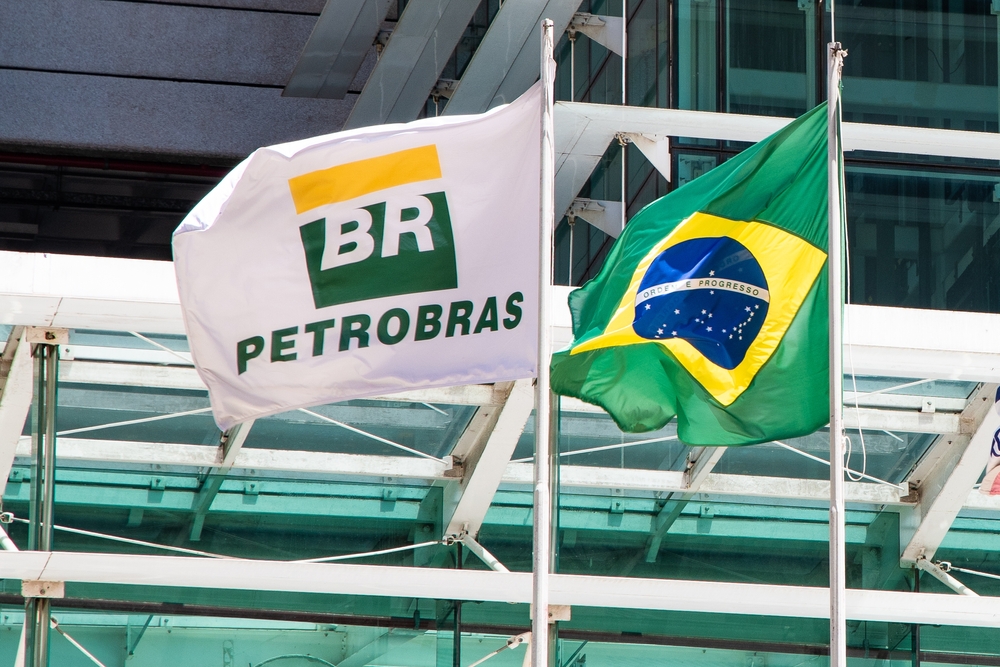Table of Content
ToggleIntroduction
Petróleo Brasileiro S.A., known globally as Petrobras, is a multinational corporation headquartered in Rio de Janeiro, Brazil. It stands as one of the largest oil and gas companies in Latin America, with an extensive portfolio that spans across the exploration, production, refining, and marketing of oil, natural gas, and other energy-related products. The company has made significant contributions to Brazil’s economy while extending its operations on a global scale, pushing the boundaries of energy innovation and sustainability practices.

Petrobras has experienced substantial growth due to its strategic market presence and investment in technology and innovation. The company’s efforts in maintaining strong investor relations and consistent financial performance have placed it in a prominent position within the international energy market. Adhering to stringent environmental, social, and governance (ESG) criteria, Petrobras endeavors to operate responsibly, balancing economic growth with ecological awareness and social welfare.
Key Takeaways
- Petrobras is a leading energy corporation with a diverse product line and involvement in various sectors of the oil and gas industry.
- It has demonstrated notable financial performance and pursues innovation to maintain a competitive edge.
- Commitment to ESG principles guides its operations and strategy, aligning with global sustainability trends.
Company Overview

Petrobras S.A. is a pivotal player in the global energy sector, recognized for its significant contributions to the oil and gas industry. Established by the Brazilian government and headquartered in Rio de Janeiro, the company has been a subject of study and analysis across various domains, from its corporate structure to its role within the market.
History and Background
Petróleo Brasileiro S.A., known as Petrobras, was founded in 1953 as a state-owned enterprise with the goal of harnessing Brazil’s oil potential. The Petrobras history aligns closely with Brazil’s economic development and the country’s political shifts, particularly under the administration of President Luiz Inacio Lula da Silva and his Workers’ Party. The “Petroleum is Ours” campaign of the 1950s bolstered national support for the establishment of the company, cementing its role in the country’s sovereignty over natural resources.
Shareholding Structure
Petrobras is a publicly traded company, with shares listed on the São Paulo, New York, and Madrid stock exchanges. Its shareholding structure comprises a mix of common and preferred shares, with significant ownership retained by the Brazilian government. This allows for a strategic alignment of the company’s goals with national interests while also engaging with private investors.
Corporate Governance
The company’s corporate governance is structured to balance government influence with market-driven practices and shareholder interests. An intricate organization chart depicts the hierarchy and the roles from the board of directors to management teams and operational staff. The governance policies of Petrobras emphasize transparency and compliance, an initiative strengthened following the corruption scandals that brought reforms in the company’s operations. Corporate governance at Petrobras aims to build trust among shareholders, regulators, and the public.
Financial Performance

Petrobras has demonstrated varying degrees of financial success, reflected in its revenue, EBITDA (Earnings Before Interest, Taxes, Depreciation, and Amortization), and ROCE (Return on Capital Employed). Their investments, strategic decisions, and financial results have been a focal point for both stakeholders and industry analysts. The company’s annual reports and periodic announcements provide detailed insight into its financial health.
Revenue and EBITDA
Petrobras’ financial records indicate a fluctuating revenue stream that can be influenced by global oil prices, production levels, and operational efficiency. Their EBITDA, a key metric used to assess a company’s operating performance, provides information on earnings while excluding the effects of financing and accounting decisions.
Recent Performance:
- Revenue: Fluctuations in accordance with global market trends.
- EBITDA: Represents operational profitability before non-cash expenses.
Investments and ROCE
The capital expenditure of Petrobras is strategically channeled towards exploration, development, and sustainable practices. ROCE, a vital performance ratio, measures the efficiency and profitability of capital investments, providing shareholders with a gauge of their returns.
Investment Highlights:
- Capital Expenditure: Allocated towards growth initiatives and sustainability goals.
- ROCE: Illustrates the efficiency of Petrobras’ investment endeavors.
Results and Announcements
Petrobras periodically releases financial results and announcements that provide updates on the company’s performance. These reports are critical for assessing its financial trajectory and operational success.
Key Information:
- Financial Results: Detailed in annual and quarterly reports.
- Announcements: Pertains to strategic decisions, market updates, and future outlooks.
Operations

Petrobras S.A. has established itself as a significant player in the global energy sector, anchored by its comprehensive operations in oil and gas. The company’s activities span from exploration and production to refining, and on to transportation and marketing, exhibiting a robust presence in offshore ventures and a notable commitment to sustainable practices.
Exploration and Production
Petrobras conducts extensive exploration to locate oil and natural gas reservoirs, and thereafter implements production strategies to extract these resources. The company has a noteworthy track record in offshore operations, particularly in deep and ultra-deep waters, solidifying its position in the energy industry. Initiatives such as the exploration and development of pre-salt layers have further underscored its capabilities in this domain.
Refining and Processing
Once extracted, crude oil is transported to Petrobras’s refineries for processing. The company operates an array of refineries that convert crude oil into valuable products like gasoline, diesel, and aviation fuel. Refining capacity is crucial for meeting domestic and international demand, and Petrobras continues to optimize its operations to enhance the yield and quality of its refined products.
Transportation and Marketing
Petrobras is also responsible for the logistics involved in the transportation and marketing of oil, natural gas, and derivative products. This involves a complex logistics structure including pipelines, maritime terminals, and a fleet of vessels. The company ensures that the extensive network operates efficiently to reliably distribute energy resources, thereby maintaining its standing as a leader in the South American market and beyond.
Global Activities

Petrobras S.A. has expanded its operations beyond Brazil, becoming influential in the international energy market through its strategic ventures and presence across various continents.
International Ventures
Petrobras operates internationally with a significant portfolio of assets in regions that include North America, South America, Africa, and the Middle East. It has gained recognition for its offshore technologies, especially in deep-water exploration and production. Notably, the company’s activities extend to other countries, indicating a strategic move to diversify and solidify its presence globally. These ventures often involve collaboration with foreign companies, allowing Petrobras to leverage international expertise and resources.
Global Bonds and Ratings
The company has engaged in the issuance of global bonds as a way to finance its operations and projects at an international level. Bond ratings by major agencies reflect the economic health and creditworthiness of Petrobras on a global scale. These ratings are instrumental in determining the terms and interest rates at which the company can raise capital. Petrobras has faced challenges, such as those caused by historical corruption scandals; however, it continues to uphold its commitments to its global bonds and stakeholders.
Environmental, Social, and Governance (ESG)
Petrobras S.A. demonstrates commitment through targeted efforts in sustainability, social responsibility, and governance. These focal areas reflect the company’s approach to ESG performance, impacting its operations and stakeholder relationships.
Sustainability and Environment
Petrobras acknowledges the environmental implications of its actions and strives for sustainability. The company has invested in solid waste treatment and disposal policies to lessen its ecological footprint. These efforts help in managing waste generated from oil production, reflecting a proactive stance toward environmental stewardship.
Social Impact
The corporation’s social initiatives aim to foster community well-being and development. Initiatives like local education programs and vocational training illustrate Petrobras’ investment in social capital. Their policies address key social aspects, ensuring that the communities surrounding Petrobras’ operations benefit from its presence.
Governance Practices
Effective governance is a cornerstone of Petrobras’ operations, underpinning investor confidence and corporate accountability. The company has mechanisms for overseeing and guiding corporate conduct. These practices ensure compliance with legal standards and ethical norms, a crucial component in maintaining stakeholders’ trust.
Product Lines
Petrobras S.A. has a diversified portfolio that manages a variety of energy product lines focused on maximizing resource utilization and catering to industrial, commercial, and consumer markets.
Petroleum and Derivatives
Petrobras has established a significant foothold in the production and distribution of petroleum and its derivatives. Its offerings include a range of petrochemical products that serve various industrial applications. The company harnesses advanced technology, as demonstrated in the development of the automotive lubricant product line, Lubrax, which emphasizes the sophistication of its petroleum derivatives.
Natural Gas
The commitment to cleaner energy sources is evident in Petrobras’ investment in natural gas infrastructure and technology. With methodologies developed to enhance the economic attractiveness of offshore projects, the company has optimized its approach to natural gas extraction and processing, streamlining the efficiency of production lines and ensuring a robust supply to meet growing demands.
Renewable Energy
Recognizing the global shift towards sustainability, Petrobras is also actively involved in the renewable energy sector. It is a key player in the production of biofuels like biodiesel and ethanol, which are essential components of Brazil’s renewable energy mix. Petrobras works to integrate renewable solutions into its product line, aligning with international environmental standards.
The company’s strategic approach to its product lines, ranging from traditional fossil fuels to innovative renewable energy sources, demonstrates its adaptability and forward-thinking vision in the global energy market.
Innovation and Technology
Innovation and technology are pivotal to Petrobras S.A.’s operations, particularly in groundbreaking deep water exploration and the development of sustainable energy initiatives. The company’s focus on leveraging advanced technologies ensures operational efficiency across its ventures.
Deep Water Exploration
Petrobras has spearheaded innovation in deep water exploration, particularly within the Brazilian pre-salt layer—a geological formation that lies offshore of Brazil in deep waters. They are renowned for their success in extracting oil from these challenging environments, often at depths exceeding 2,000 meters. Through innovative subsea systems and advanced drilling technologies, Petrobras has transformed the pre-salt region into a significant oil and gas production area.
- Notable Achievements:
- Development of technology for oil extraction at depths of over 2,000 meters.
- Implementation of cutting-edge seismic survey techniques to accurately map the pre-salt layer.
Renewable Energy Projects
Petrobras is expanding into renewable energy projects with a focus on biofuels, wind energy, and solar power within South America. These projects align with global efforts to transition to sustainable and environmentally friendly energy sources. Concurrent with its oil and gas endeavors, Petrobras is investing in research to optimize renewable energy output, thereby diversifying its energy portfolio.
- Renewable Initiatives:
- Investment in biofuel technology development.
- Launch of wind and solar energy pilot projects to assess viability in the South American context.
Operational Efficiency
They continuously seek to improve operational efficiency through the adoption of state-of-the-art technologies and project management strategies. Innovations such as digital twins—the virtual replication of oil platforms—and predictive maintenance systems are at the forefront of reducing costs and enhancing the safety of operations.
- Efficiency Measures:
- Deployment of digital twin technology for real-time operational monitoring.
- Incorporation of predictive analytics to foresee maintenance needs and avoid downtime.
In deploying these technologies, Petrobras demonstrates a commitment to progress in the oil and gas industry, while also paving the way toward energy diversification and efficiency.
Investor Relations
Petrobras S.A. is a publicly-traded company that maintains transparent and timely communication with its investors and stakeholders. The investor relations section provides detailed insights into stock performance, dividend policies, and important financial dates.
Stock Information
Petrobras is traded on BM&F Bovespa in São Paulo with ticker symbols PETR3 for common shares and PETR4 for preferred shares. Internationally, Petrobras’s shares are listed as American Depositary Receipts (ADRs) on the New York Stock Exchange (NYSE) under the ticker symbol PBR. Investors can access stock performance reports and historical data to analyze the company’s market trends.
Dividend Policy
Petrobras’s dividend policy reflects its commitment to shareholder returns, based on profitability and aligned with its strategic priorities. Dividend distributions are subject to board approval, and past distributions do not necessarily indicate future dividends. Investors can review the complete dividend history and policy details on the Petrobras investor relations website.
Financial Calendar
The financial calendar is an essential tool for investors, highlighting key dates such as quarterly earnings reports, payment of dividends, and annual general meetings. Petrobras maintains an up-to-date calendar to help stakeholders stay informed about forthcoming events and financial disclosures. The accurate scheduling of these events underscores the company’s dedication to transparency and enables efficient investor planning.
Market Presence and Strategy
Petrobras S.A. stands as a major entity in the global oil market with strategic measures tailored to improve its competitive edge and market share. The company’s initiatives span from assertive marketing tactics to forging partnerships that enhance its operational scope and market reach.
Competitive Position
Petrobras solidifies its market presence through a significant share in Brazil’s oil sector and a proactive stance on the B3, Brazil’s main stock exchange. Its competitive strategy includes continuously optimizing production processes and capitalizing on the strategic value of its holdings in the pre-salt layer of the Santos Basin.
Marketing Initiatives
Marketing strategies implemented by Petrobras focus on correlating its brand with innovation and sustainability. These initiatives strive to foster positive public perception and customer loyalty. The company leverages digital marketing platforms to reach a broader audience, ensuring robust customer engagement and service delivery.
Strategic Partnerships
Petrobras is known for establishing strategic partnerships that contribute to its growth and resource development. Through alliances with other industry players, Petrobras amplifies its technological capabilities, accesses new markets, and enhances its geological expertise, particularly within the prolific Santos Basin region. These partnerships are crucial in driving its internationalization strategy and strengthening its position in the global market.
Regulatory and Legal Aspects
Petrobras S.A. operates within a complex regulatory environment and faces various legal challenges. The company must adhere to Brazilian and international laws and regulations, and it frequently addresses litigation issues and disputes.
Compliance and Regulation
Petrobras is subject to extensive regulatory compliance measures, particularly in its role within the Brazilian pre-salt oil fields. The establishment of entities like Pré-sal Petróleo SA (PPSA) has introduced additional layers of oversight. Petrobras has to operate within the legal framework stipulated by the Brazilian government, which includes strict protocols on oil extraction, environmental protection, and investment policies.
A significant part of their regulatory compliance revolves around capitalization and adherence to the norms set by PPSA, ensuring a coordinated effort in the exploration and production of hydrocarbons. The legal regulation of petroleum upstream in Brazil demands that Petrobras not only follows these governance rules but also addresses the nation’s energy policies and public interest.
Litigation and Disputes
Petrobras has been involved in multiple litigations and disputes, reflecting the contentious nature of the energy sector. Issues have emerged around contract negotiations, environmental liabilities, and commercial operations that sometimes lead to complex legal challenges. It’s also worth noting that changes in Brazil’s regulatory framework, such as the introduction of the Brazilian 2010 oil regulatory framework, have at times led to crowding-out investment effects and resulting legal tensions between Petrobras and other stakeholders, including government entities.
The relationship with other national bodies like PPSA often navigates through intricate legal terrain, especially when there are conflicting interests or interpretations of the regulatory statutes. These disputes require careful legal maneuvering and are pivotal in shaping the company’s strategies and operations.
Operational Indicators
Petrobras S.A. meticulously tracks operational indicators to assess and enhance its performance across various domains, including production and refinery operations. These metrics provide insight into the efficiency and sustainability of its activities.
Production Metrics
Petrobras closely monitors its production metrics, particularly in the Santos Basin and Campos Basin, key areas for its extraction activities. 2024 data exemplifies the company’s success in optimizing output, with a notable increase in daily barrels of oil equivalent (boe). At the forefront, the Santos Basin has seen a surge in its volumes, contributing significantly to the national production tally.
- Campos Basin: Achievements include maintaining high productivity despite mature field challenges, indicating effective field management strategies.
Refinery Throughput
Refinery throughput refers to the volume of crude oil and feedstocks processed in Petrobras’s facilities. This operational indicator is crucial for gauging the efficiency of Petrobras’s refining segment.
- Data reflects optimal utilization rates, indicating robust operational discipline and alignment with market demand. Specific figures underscore the strategic management of refining assets, balancing production with both domestic and international commodities pricing dynamics.
Frequently Asked Questions
Petrobras S.A., a significant player in the global oil and gas sector, has encountered various challenges and developments. Here we address some common inquiries regarding the company’s activities and status.
What was the nature of the scandal involving Petrobras?
Petrobras was at the center of a large-scale corruption scandal, identified as Operation Car Wash. This involved bribery and money laundering, where company executives colluded with construction firms to overcharge Petrobras for building contracts, skimming the excess funds.
Where are Petrobras’s operational locations?
Petrobras operates primarily in Brazil, with its activities spanning across various regions of the country. The company also has a presence in other international locations, including the Gulf of Mexico, Africa, and the North Sea.
What are the latest developments in Petrobras news?
Recently, Petrobras has been focusing on strategic divestment plans to optimize its portfolio and reduce debt. They have been selling assets in different segments, including upstream and downstream operations.
Where is the Petrobras headquarters located?
The headquarters of Petrobras is situated in Rio de Janeiro, Brazil. This location serves as the central hub for the company’s management and administrative activities.
Who is the current CEO of Petrobras?
The CEO of Petrobras changes periodically. As of the knowledge cutoff in 2023, the then-current CEO’s information might be dated. One should consult the most recent reports or Petrobras’s official website for the current CEO’s name.
What is the relationship between Petrobras and PETRONAS?
Petrobras and PETRONAS, the Malaysian state-owned oil and gas company, have engaged in business collaborations. These collaborations have included agreements on sharing technology and mutual investment in energy projects.












